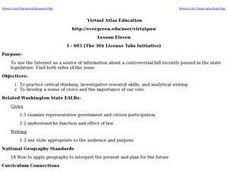Curated OER
The Great Depression and the New Deal
Students examine New Deal legislation. In this Great Depression lesson, students read the listed materials in order to gain insight into what American citizens thought about New Deal legislation when it was passed.
Curated OER
Progressivism: What's the Problem?
Eighth graders interpret historical evidence presented in primary and secondary resources. In this Progressive Era activity, students examine the goals and accomplishments of the Populist Party.
Curated OER
Laws Promoting Healthy Aging: A Comparison of Japan and the United States Lesson Plan
Students compare and contrast legislation passed in Japan and the United States in regards to the elderly. Using the Internet, they research how the government has put programs into place to improve the health of older citizens. They...
Curated OER
It's All About Power
Students explore the legislative process by discussing a current issue dealing with energy policy. They explain the role of government and how it affects their quality of life. Students identify and list the groups that create energy...
Curated OER
The Duties of Governments: Dix vs. Pierce
Students examine the role of Dorothea Dix on behalf of people with disabilities. They discuss President Pierce's veto of legislation she helped create. They address the rights and responsibilities of citizen's and the role of government.
Curated OER
A New Voting System for B.C.
Eleventh graders examin past elections results of British Columbia. They prepare a proposal for the Citizens' Assembly on Electoral Reform.
Curated OER
3 Branches of Governement
Sixth graders use the "Making the Grade" books, citizenship packets, and the "Ben's Guide" website to create a poster and a report on their assigned government branch. They then present their poster and report to their classmates.
Curated OER
Government Lesson Plan: Lesson Plan 6
Students examine legislation on immigration policies. They discuss current immigration laws, read a handout, complete a chart, and answer discussion questions.
Curated OER
Who Has the Greatest Voice?
Students identify the impact that interest groups, scientists, government health organizations and legislators have on health issues in the United States. They explain the role of the committee hearing in the lawmaking process. Students...
Curated OER
But They Never Told Me!
Students investigate how government legislates the protection of citizens from natural disasters such as earthquakes in California. They read the Alquist-Priolo Special Studies Act and debate its pros and cons. They discuss how much...
Curated OER
The New Statesman (1987-1992)
Students study the work of the House of Commons and consider the importance of debate in the legislative process. They consider why politics is a popular subject for television sitcom and other formats. They explore the four main...
Curated OER
Personal History
Fourth graders gain an appreciation of knowledge about recent history by interviewing senior citizens. They summarize their interviews and organize them into a written presentation.
Curated OER
Government
Eighth graders analyze the purposes of government. They examine or assess the importance of citizenship to the individual or to society at large (e.g., the importance of voting). Students explain the structure and functions of the three...
Curated OER
Dorothea Dix: Reform in Massachusetts
Students examine the life and reform efforts of Dorothea Dix on behalf of people with disabilities. They discover how her efforts resulted in the passage of legislation. They also examine the care people with disabilities receive.
Curated OER
Bringing Up Baby
Learners explore why a government might want to influence its citizens with regards to decreasing or increasing the birthrate. They draft laws and write analytical essays.
Curated OER
The Bill Of Rights And The News
Students investigate the concepts related to the Bill Of Rights. They conduct research using a variety of resources and focus upon the human rights provided in the legislation. Students read a news article and reflect the upon the...
Curated OER
Compare/Contrast: The United States and Alaska Constitutions
Students compare and contrast the United States and Alaska Constitution. After reading each preamble, they identify the reasons for each constitution to be drafted and discuss what they reveal about citizens responsiblity in government....
Curated OER
I 695 (The 30$ License Tabs Initiative)
High schoolers research the bill I 695 issue. They discuss the topic before they research the issue of I 695. Students discuss how new laws are always being created and the differences in opinion about these laws. They see how this...
Humanities Texas
Primary Source Worksheet: Franklin D. Roosevelt, First Inaugural Address
Young historians will learn not to fear primary source materials (or fear itself, for that matter) thanks to this resource that uses Franklin D. Roosevelt's March 4, 1933 Inaugural Address to model how to conduct a close reading of such...
Curated OER
United States Government 5th Grade
In this review of United States government worksheet, 5th graders recall facts and answer multiple choice questions. Students answer 25 questions.
Curated OER
Statehouse Time Capsule
Fourth graders create a time capsule that is representative of their community. They explain why the chosen objects are representative of themselves or their community.
Delegation of the European Union to the United States
Structure of Government within the EU
The political system of the European Union is historically unique and has been constantly evolving. To better understand the structure of the EU, class members compare the EU's branches to those of the United States Federal Government.
Curated OER
Come Fly with Me . . . Open a Book: Travels through Literature
This detailed overview of a curriculum unit suggests using travel literature to engage and stimulate your third graders’ interest in reading. The suggested reading list includes fiction and non-fiction materials and offers urban children...
Curated OER
INVITING CANDIDATES TO CLASS
Learners explore the election process by researching politcal platforms, inviting candidates to speak, surveying registered voters, and running a mock election.























